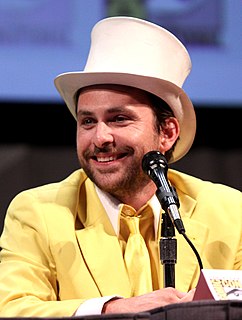A Quote by Beth Ditto
I never went to college and I was raised in Arkansas so there wasn't a lot of academic language being thrown around my house. We weren't idiots, but I didn't have that access to academic feminism. I had to realize, on my own, that feminism is not just about how far ahead you can get in a job and it isn't about not wearing makeup. It isn't about not watching your waistline. I had to recreate the world entirely.
Related Quotes
I'm not an academic; I'm not an archaeologist. I'm a writer, communicating ideas to the public. There is a model of how the past is, and a lot of academic archaeology is about refining the model. It's not about changing the model radically. I'm not aware of any current which is about radically changing the model. It's just me, really.
On YouTube, there's a right-wing extremism funnel. You start by watching a college student ranting about how dumb feminism is. It's wrong, but it's not especially sinister. And then, three suggested videos later, you're hearing about why we need a white ethno-state to save the race from a third-world invasion.
I think feminism has always been global. I think there's feminism everywhere throughout the world. I think, though, for Western feminism and for American feminism, it not so surprisingly continues to center Western feminism and American feminism. And I think the biggest hurdle American feminists have in terms of taking a more global approach is that too often when you hear American feminists talk about international feminism or women in other countries, it kind of goes along with this condescending point of view like we have to save the women of such-and-such country; we have to help them.
Let's admit that feminism came from liberalism and it was very positive. But then it went dark. It went into a bad place. When feminism replaced biology with social construct, they started to say that everything about a human being was created by your environment or by your - by environmental cues as opposed to innate traits... Like you didn't achieve what you could get because it was your fault. They denied traits that are applied across all cultures. And that's where feminism went wrong is it denied biology and makes them look foolish.
There was no real strategic decision about editorial tone. It was kind of a write whatever you want to write, and we'll see how it goes. I think that we lucked out in that all of the women who started writing at Feministing.com were really funny, and I don't think that's something people are used to seeing or hearing when they read feminism. You know, you think feminism and you kind of think academic, women's studies, dry, humorless; there are all of these stereotypes that go along with what feminist thought is and what feminist writing is.
Phil Gramm had a stump speech about how his mother's devotion kept him from being an academic failure in life. She got him into a special school that turned him around - under a government program for the children of deceased veterans. He was repeatedly asked at press conferences why he would then turn around and support draconian cuts in federal funding for education. He never had an answer.

































